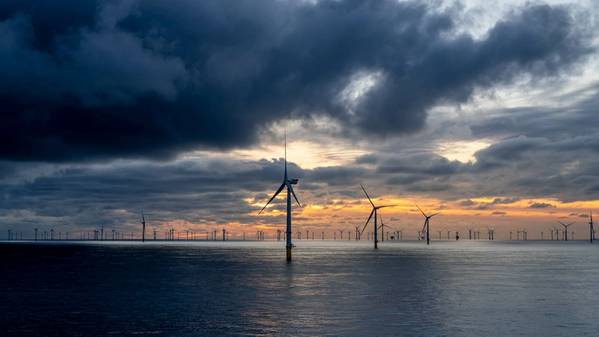
Leaders from European countries surrounding the North Sea pledged on Monday to rapidly scale up offshore wind power generation in the region to strengthen energy security, at a summit in Ostend, Belgium.
Leaders from seven European Union countries, including France, Germany and the Netherlands, alongside non-EU countries Norway and Britain pledged to speed up their buildout of wind farms, develop "energy islands" - or connected renewable generation sites at sea - and work on carbon capture and renewable hydrogen projects in the region.
The aim is to curb reliance on Russian gas, and reduce use of CO2-emitting fossil fuels.
"Because of Russia's brutal war on Ukraine, it has made it absolutely clear that we need to produce more energy ourselves," said Danish Prime Minister Mette Frederiksen, who added that the massive expansion of renewable energy was crucial to fight climate change.
In a joint statement, the countries' leaders said they would aim for a combined 120 gigawatts (GW) of offshore wind capacity by 2030 in the North Sea and northern seas including the Irish sea, and 300GW by 2050.
That would more than quadruple the countries' 25GW of existing North Sea wind capacity. Belgium, Denmark and Ireland plus Luxembourg, which does not have a coast, also signed the pledge.
The United Kingdom signed the declaration but Prime Minister Rishi Sunak did not attend the summit.
The countries also pledged to work together to protect offshore energy infrastructure against security threats. Such concerns have heightened since unexplained blasts last September ripped holes in the Nord Stream pipelines linking Russia and Germany.
"This declaration is also a great chance to really get security into the design of all new wind farms and infrastructure," said Dutch energy minister Rob Jetten, who attended the summit alongside energy ministers from the other eight countries.
Some countries announced projects to spur the green energy push. The Netherlands and Britain said they plan to build Europe's biggest cross-border electricity link connected to an offshore wind farm.
European companies, however, including Orsted and Equinor, warned that their sector is currently too small to support the infrastructure expansion, and increased policy support and funding would be needed to deliver the targets.
French President Emmanuel Macron said the buildout of offshore wind must be driven by European manufacturers, to avoid the expansion of renewable energy creating new dependencies on foreign imports.
"This is a very important opportunity in terms of sovereignty and resilience," Macron told a news conference.
Final investment decisions in European offshore wind farms hit a 10-year low in 2022 as developers faced record-high inflation, soaring interest rates and volatile energy markets.
Investment has recovered since, but in future years, investments in Europe's wind energy supply chains are expected to fall short of green energy goals, Wood Mackenzie analysts said.
The EU and Norway also pledged on Monday to work together to use depleted North Sea gas fields to capture and store CO2 from industrial emissions.
(Reuters - Reporting by Kate Abnett, Marine Strauss, Julia Payne; editing by Barbara Lewis and Jonathan Oatis)